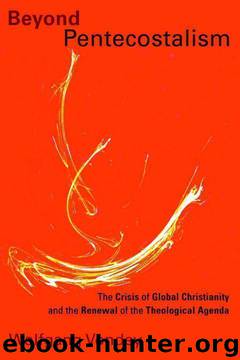Beyond Pentecostalism: The Crisis of Global Christianity and the Renewal of the Theological Agenda (Pentecostal Manifestos) by Wolfgang Vondey

Author:Wolfgang Vondey
Language: eng
Format: epub
Published: 2011-08-02T21:12:00+00:00
Enlarging the Playground of the Liturgy
From the perspective of liminality, the enlarging of the playing field expands the ambiguous threshold of ritual practice to the entire realm of life and creation. This dynamic is fundamentally Spirit-oriented, as Amos Yong puts it, since in the liturgy "the Holy Spirit transforms the community of faith from moment to moment so that it can more fully realize and embody here and now the image and likeness of the eschatological Christ.""' While Yong emphasizes the centrality of the Spirit's work in the liturgy, he also hints at the eschatological openness of the community to diverse forms of transformative experiences in the global Christian community. Pentecostal scholarship has shown that Western and non-Western constructions of Pentecostalism differ in their emphasis on the orality, indigenization, contextualization, and enculturation of Christian faith and practice.179 While it may therefore be permissible to speak of classical Pentecostalism as an effective carrier of African American spirituality, the global Pentecostal movement shows a remarkable adaptability to any variety of different liturgical activities. A similar development can be found in the historical maturing of classical Pentecostalism in North America, which has become characterized by a number of emerging subcultures and multicultural practices.18' Pentecostalism is, in this sense, a "movement" characterized by a liminality that exhibits what Margaret Poloma calls "the Spirit at play" in a "playful atmosphere" that continually calls for more of the presence of God.l81 As play, the liturgy encourages theological curiosity.182 For Pentecostals, Simon Chan remarks, church is the realization of the "aimlessness" of the liturgy.183 This atmosphere of play allows the liturgy to be subject to continual transformation, open to conservative and progressive cultural influences, the incorporation of the high church liturgy (as in the Anglo-European context), the integration of indigenous religious rituals (Pentecostalism in Korea), the mediation of ethnicity and gender (African-Caribbean Pentecostals), the appropriation of historic ecclesiastical arrangements (Pentecostalism in Africa), the acceptance of political semantics and language (Pentecostalism in Latin America), or the differentiation of diverse religious subcultures and their respective impulses (Pentecostalism in South Asia).184
This tendency to embrace the world in play highlights the liminal nature not only of the liturgy in general, but also of Pentecostalism in particular.185 The task of theology, if it is to allow for the play of the imagination, is to "arrange" its liturgical sensibilities to provide opportunities for a Spirit-oriented participation of all the faithful. The question is not one of collecting an array of appropriate liturgical texts or of establishing a (however loosely defined) structural framework but of lifting the rational, structural, and performative means and expectations that have come to define Christian praxis. In this sense, the notion of play points to dimensions of the liturgy that offer a way beyond the deadlock of juxtaposing the efficacy of signs with the freedom of the Spirit, accenting freedom and sign in a way that allows them to be mutually defining in playful interaction. Nonetheless, theology from a liturgical perspective has yet to identify the realm of nonrational,
Download
This site does not store any files on its server. We only index and link to content provided by other sites. Please contact the content providers to delete copyright contents if any and email us, we'll remove relevant links or contents immediately.
| Anglican | Baptist |
| Book of Common Prayer | Calvinist |
| Episcopalian | Inspirational |
| Lutheran | Methodist |
| Pentecostal & Charismatic | Presbyterian |
| Quaker | Seventh-Day Adventist |
| Shaker | Theology |
Angels by Billy Graham(1926)
How To Be Born Again by Billy Graham(1781)
Peace with God by Billy Graham(1689)
Unbroken Curses by Rebecca Brown & Daniel Yoder(1575)
God's Prophetic Symbolism in Everyday Life by Adam Thompson & Adrian Beale(1497)
The School of Biblical Evangelism by Ray Comfort(1438)
Call by Rick Joyner(1430)
Martin Luther: The Man Who Rediscovered God and Changed the World by Eric Metaxas(1399)
Power over the Enemy by John Osteen & Joel Osteen(1354)
Jonathan Edwards: A Life by Marsden George M(1236)
Fresh Wind, Fresh Fire by Jim Cymbala(1234)
Prayers That Bring Healing and Activate Blessings: Experience the Protection, Power, and Favor of God by John Eckhardt(1222)
Liturgy of the Ordinary by Tish Harrison Warren(1220)
The Supernatural Power of a Transformed Mind Expanded Edition: Access to a Life of Miracles by Bill Johnson(1207)
Unmasking the Devil: Strategies to Defeat Eternity's Greatest Enemy by John Ramirez(1206)
An Altar in the World by Barbara Brown Taylor(1195)
Reformation Theology by Littlejohn Bradford(1187)
Seeing the Voice of God: What God Is Telling You through Dreams and Visions by Smith Laura Harris(1142)
Martin Luther by Mansch Larry D.; Peters Curtis H.;(1131)
